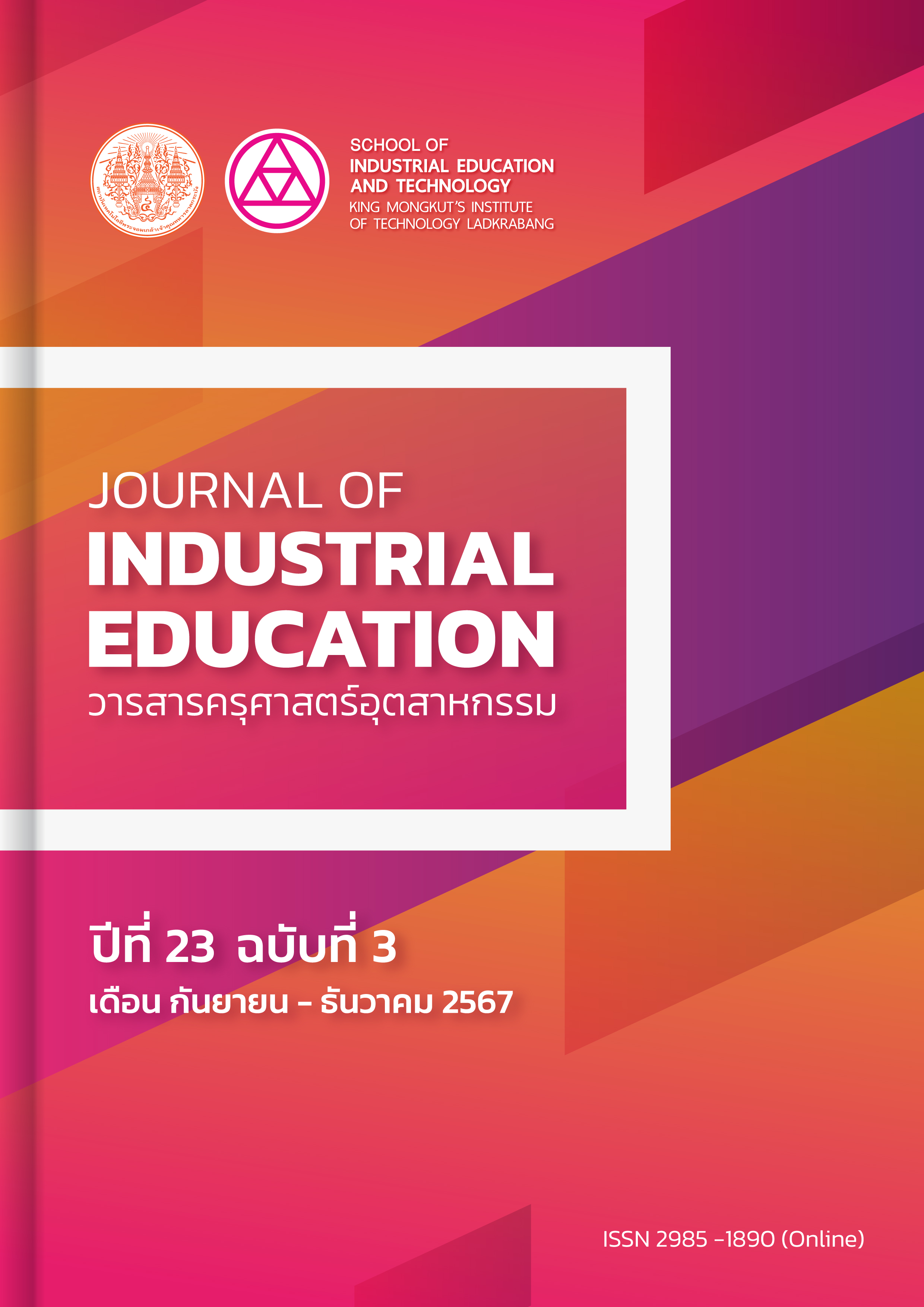FACTORS AFFECTING ONLINE LEARNING CASE STUDY OF CHITRALADA VOCATIONAL SCHOOL
DOI:
https://doi.org/10.55003/JIE.23305Keywords:
Teacher factors, Student factors, Characteristics of online learningAbstract
This research is a study of factors affecting online learning, case study of Chitralada Vocational School. The population of this research were 648 Vocational Certificate and Higher Vocational Certificate students. According to Taro Yamane's principles, the researcher established the sample by means of a simple random sampling. The research tool was electronic questionnaires that descriptive statistics, such as means (), percentages (%), frequencies, and standard deviations (SD), were used to analyze the data. For testing the hypothesis of analyzing the influence of independent variables, the statistic methods are by using inferential statistics and multiple regression analysis statistics. According to the results of the study, factors affecting online learning are with the highest average: Teacher side; Using the PowerPoint presentation to educate including text, graphics, audio, and video (
= 3.88, SD = 1.143); Quality and speed of internet signal (
= 4.08, SD = 0.999); and the final exam after class (
= 3.80, SD = 0.972). Student side; Availability of place (
= 3.84, SD = 1.035) and intention to attend online classes according to the schedule (
= 3.84, SD = 1.110); and Quality and speed of internet signal (
= 3.97, SD = 1.062). Characteristics online learning factor with the highest average is the highest average: the subject taught with theory which is suitable for online learning (
= 3.62, SD = 1.099).
References
Boonmepiphit, S. (2021). Factors of information technology system influencing online learning of secondary school students in Samutprakarn Province [Master’s thesis]. University of the Thai Chamber of Commerce. (in Thai)
Boonsri, N. (2022). Development of online learning model by using collaborative learning with ARCS model to enhance achievement motivation for undergraduate students [Doctoral dissertation]. Silapakorn University. (in Thai)
Chakornpradit, P. (2018). Determination to live in a cashless society among of consumers in the Bangkok Metropolitan area [Master’s thesis]. Srinakharinwirot University. (in Thai)
Chitramung, A. (2017). Study of learning management using online lessons with courses computer project, Theeparatpittaya School Suratthani. https://web.tpp.ac.th/60/wp-content/uploads/2018/09/%E0%B8%9B%E0%B8%81%E0%B8%99%E0%B8%AD%E0%B8%81.pdf. (in Thai)
Homthip, P. (2022). COVID-19 transformed to endemic in Thailand, Office of Legal, the Secretariat of the Senate. https://www.senate.go.th/assets/portals/93/fileups/253/files/san/Covid19.pdf. (in Thai)
Kanjanathanaseth, B. (2020). Instructional design that affect learning effectiveness through Massive Open Online Courses (MOOCs) of the generation Y workers in Bangkok [Master’s thesis]. NIDA University. (in Thai)
Khasasin, R., Prachuabmoh, A., Khasasin, K., Rasmidatta, V., & Udomthanavong, S. (2021). Factors affecting online teaching and learning among students Thai-Nichi Institute of Technology. Journal of Corporate Management and Local Innovation, 7(8), 237-252. (in Thai)
Kong, S.-C. (2021). Delivery and evaluation of an e-Learning framework through computer-aided analysis of learners’ reflection text in a teacher development course. Research and Practice in Technology Enhanced Learning, 16, 1-22.
Maneenil, S., & Tanamai, S. (2020). Development of Massive Open Online Course (MOOC) instructional model based on collaborative learning for learners with different learning style. Journal of Education Sukhothai Thammathirat Open University, 13(1), 15-29. (in Thai)
Maneewongse, N. (2021). Students behaviors and factors achieving online teaching with Line application during COVID-19. Journal of Educational Studie Faculty of Education Bansomdejchaopraya Rajabhat University, 15(1), 161-173. (in Thai)
Ninsuk, P. (2004). e-Learning. Journal of Academic Resources, 15(2-3), 1-6. (in Thai)
Niyomrat, P., Artpairin, J., Watcharakan, P., & Raksatan, C. (2021). Online teaching format under the circumstances of Coronavirus Disease 2019. Journal of Human Society Studies Nakhon Si Thammarat Rajabhat University, 11(2), 1-16. (in Thai)
Reich, J., & Ruipérez-Valiente, J. A. (2019). The MOOC pivot. Science, 363(6423), 130-131.
Setakhun, O. (2017). Factors affecting e-Learning outcomes [Master’s thesis]. Chulalongkorn University. (in Thai)
Shetu, S. F., Rahman, M. M., Ahmed, A., Mahin, M. F., Akib, M. A. U., & Saifuzzaman, M. (2021). Impactful e-Learning framework: A new hybrid form of education. Current Research in Behavioral Sciences, 2, 1-7.
Sirikanchai, H., & Sujivorakul, C. (2021). The study of learning styles of students and their opinions toward online teaching class in the subject of theory of structures: A case study of diploma I, building construction division, Nan Technical College. Vocational Education Innovation and Research Journal, 5(2), 200-213. (in Thai)
Sooksena, N. (2022). The factors that affect the performance of the MBA students at Ramkhamhaeng University, Faculty of Business Administration Program in Management, Ramkhamhaeng University. https://mmm.ru.ac.th/MMM/IS/mmm25/6314131052.pdf. (in Thai)
Thungkanai, K. (2021). Blended learning in a new normal. Journal of Educational Studies Faculty of Education Bansomdejchaopraya Rajabhat University, 15(1), 29-43. (in Thai)
Tungantong, C. (2017). Factors affecting learning achievement on online supplement learning [Master’s thesis]. Chulalongkprn University. (in Thai)
Wang, Q. (2008). A generic model for guiding the integration of ICT into teaching and learning. Innovations in Education and Teaching International, 45(4), 411-419.
Watanakanjana, C., Trichan, P., Puapornpong, T., & Rittiboonchai, W. (2021). Effectiveness of online-learning of lecturer’s competence and assessment: A case study of faculty of management science, Nakhon Pathom Rajabhat University. Social Science Journal of Prachachuen Research Network, 3(2), 1-13. (in Thai)
Wayo, W., Charoennukul, A., Kankaynat, C., & Konyai, J. (2020). Online learning under the COVID-19 epidemic: Concepts and applications of teaching and learning management. Regional Health Promotion Center 9 Journal, 14(34), 285-298. (in Thai)
Downloads
Published
How to Cite
Issue
Section
License
Copyright (c) 2024 Journal of Industrial Education

This work is licensed under a Creative Commons Attribution-NonCommercial-NoDerivatives 4.0 International License.
"The opinions and contents including the words in papers are responsibility by the authors."
"ข้อคิดเห็น เนื้อหา รวมทั้งการใช้ภาษาในบทความถือเป็นความรับผิดชอบของผู้เขียน"



